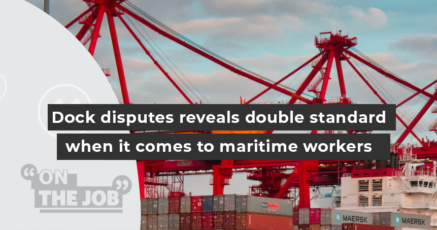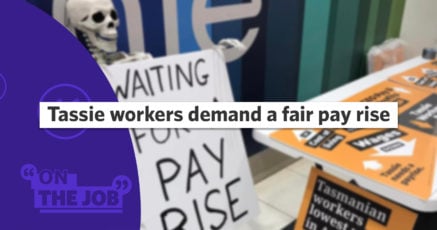There is a smart way to handle a crisis in any community.
Listen to the predicament people are in. Include them in the process of finding solutions. Outline the goals you have set in consultation with the members of that community and why it’s important to reach them. Provide clear and unequivocal communication of what needs to be done and why.
And above all – make sure the people who are most affected by your actions feel included, valued, heard and important.
Then there is the SPC way – ruling by proclamation and press release.
Last Thursday, the food production giant unilaterally proclaimed ‘a no jab, no work policy’ for its workforce, demanding that workers book themselves in for a vaccination shot by September 15th and show that they have received one dose by October or forget about showing up for work.
“This company did not have any dialogue with the workers, instead they sent an email to the union [AMWU] at five o’clock the night before they decided to publicly announce that they were going to introduce this policy,” Australian Council of Trade Unions Assistant Secretary (ACTU), Liam O’Brien told “On the Job”.
O’Brien points out that the demands made by the food giant, responsible for some of Australia’s biggest brands such as Goulburn Valley Fruits and Ardmona, simply isn’t based in reality – especially when SPC workers under 40 still aren’t eligible to book their recommended vaccine.
For a company that should know how important it is to have stock on the shelves, they clearly haven’t looked in the store window.
“Right now, demand is outstripping supply. We do not have a problem with hesitancy at the moment. There are more people that want to get vaccinated that can get vaccinated,” said O’Brien.
“The real problem is people cannot get vaccinated who want to get vaccinated.”
As ACTU Assistant Secretary, Liam O’Brien has purview regarding Work Health and Safety issues and is well versed in implementing changes in workplaces and workplace culture to ensure the safety and wellbeing of workers.
He insists that the only effective strategy is a collaborative approach that includes workers and the unions as partners and part of the solution – not treating them as the source of the problem.
“If we do get to a situation where the Government has improved the rollout to the point that we’ve fixed distribution issues and satisfied demand but we haven’t achieved a high enough rate of vaccination – then the first thing we need to do is to encourage people to get vaccinated by providing them with support in the workplace to make that decision,” O’Brien explained.
“That means we need to provide paid vaccination leave.”
“Before we get heavy-handed and start using coercive tactics, we need to do everything we can to ensure that we’re supporting people to get vaccinated voluntarily.”
“That’s how vaccination programs have worked forever.”
O’Brien accepts that there are some workplaces where mandatory vaccination may be imperative.
“We’ve done time and time again where there is a public health order that requires some workers to be vaccinated. There may be some high-risk workplaces, where workers are likely to be exposed to COVID, like in hotel quarantine, potentially international travellers, or international flights, those sorts of circumstances where mandatory vaccination might be required but that should be a decision of public health officials, not individual employers.”
The Australian Manufacturing Workers Union (AMWU) represent the workers at SPC’s huge facility in regional Victoria. They believe the company’s arbitrary and unilateral action on vaccination is particularly insulting.
AMWU Assistant State Secretary for Victoria (Food and Confectionery division), Jason Hefford, outlines that the same workers who the company is trying to bully over vaccination were the same workers who became frontline heroes of the pandemic in 2020, keeping the country fed.
“These essential food workers carried us through a pandemic and have shown extreme willingness to work together, but the company had failed to properly consult with them on mandatory vaccination,” Hefford said.
“Taking away a worker’s meal ticket because they haven’t had the opportunity to be vaccinated fails to recognise some workers will have specific health advice not to be vaccinated.”
Liam O’Brien makes it clear that unions want all Australian workers that can be vaccinated to be vaccinated – and that they stand ready to be partners in that endeavour.
“What I would be encouraging employers to do is to sit down with unions and representatives of the workforce to discuss how we can assist workers making that decision to get vaccinated.
“The first thing to do would be to provide support for workers whether they be permanent or casual, to access paid leave to go and get vaccinated.
“We’ve got about 1.3 million workers now covered by paid vaccination leave, that unions have won around the country. So, most employers want to do the right thing and they know that the best way to encourage vaccination is to support workers making that decision not to force them.”













SHARE:
Consultation, not coercion the key to vaccinating workers